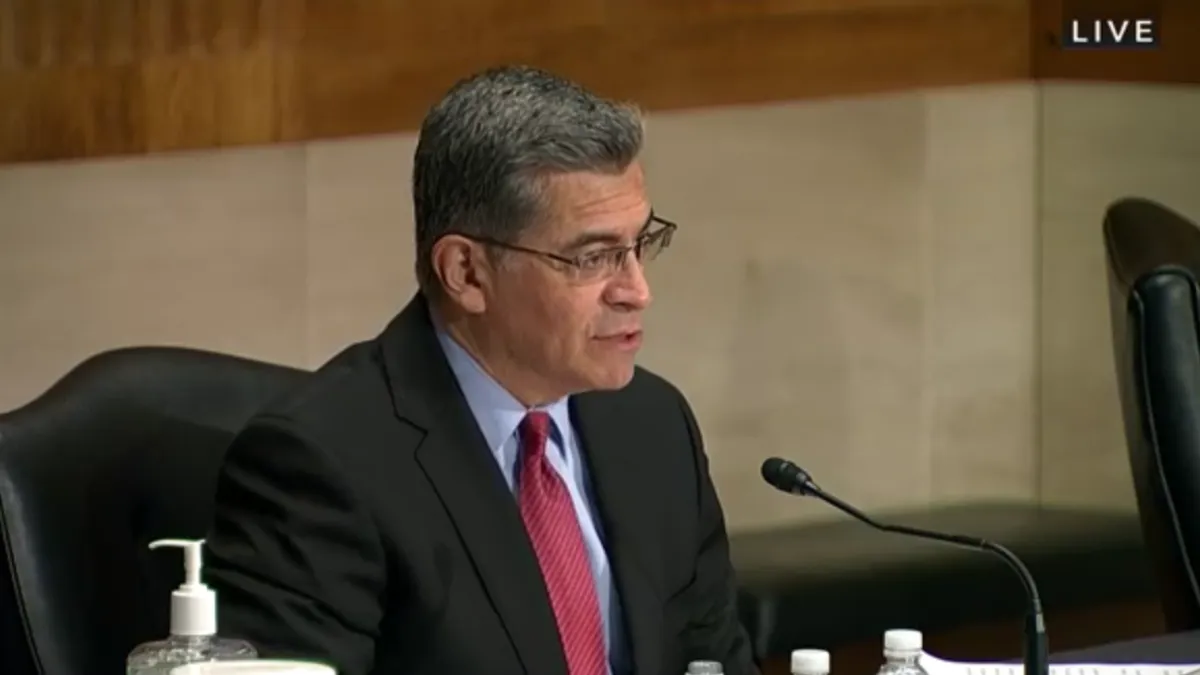Xavier Becerra had a mostly smooth nomination hearing before the Senate health committee Tuesday despite accusations from some GOP members on his support for abortion rights, lack of medical credentials and executive experience in the face of the COVID-19 public health emergency.
Becerra, the California attorney general and President Joe Biden's pick to head up HHS, defended his work on healthcare antitrust issues in his state, which he also represented in Congress for 24 years. As HHS chief he would guide the administration's response to the pandemic, with oversight over CMS, the National Institutes of Health and FDA.
He will now face questioning from the Senate Finance Committee, which will vote on whether his nomination goes to a full Senate vote Wednesday afternoon.
Becerra highlighted his work as AG to take on lack of competition in healthcare markets. "I've taken on drugmakers and hospitals who unfairly jack up prices on patients," he said in his opening remarks. He referred to his lawsuit against Sutter Health, which claimed antitrust practices by the health system and ended with a $575 million settlement agreement.
Still, he has the support of provider lobbies like the American Hospital Association and American Medical Association, among other industry groups.
While not assured, Becerra's confirmation is more likely than not. He didn't face particularly barbed questions from more moderate GOP Sen. Lisa Murkowski of Alaska, who asked mostly about improving access to care in rural areas.
More hard-line Republicans, though, brought up the nominee's previous voting record on abortion rights and requested a pledge to not spend any taxpayer money on the service.
Becerra needs at least 50 votes for confirmation, as Vice President Kamala Harris could break a tie and vote in his favor. More conservative Democrats like Sen. Joe Manchin of West Virginia may be on the fence but haven't indicated their intentions yet.
The issue of price transparency for healthcare services was brought up multiple times. Becerra said he stands behind pushing providers to make their prices known, as was recently required for hospitals under the prior administration.
"The American people are entitled to know what they're buying, especially if it's a life or death situation," he said. "So what I can say to you is we will do robust enforcement to make sure price transparency is there for all Americans, because for far too long, people have never had an idea what they're going to pay when they walk into a hospital."
Other policies touched on included Becerra's support for collecting more inclusive data to improve health equity, expanding use of telehealth even after the COVID-19 pandemic is more under control and making sure life-saving drugs like insulin are affordable.
He also said more should be done to support primary care providers, such as incentivize people to enter the medical workforce and achieve parity for behavioral health services.
When asked about the Biden administration's COVID-19 response, Becerra emphasized the need to educate people about the vaccines and work with states to improve distribution.
Sen. Bill Cassidy, R-La., tried to trip Becerra up with a relatively technical question about the 340B drug program, asking whether there should be statutory definitions for "contract pharmacy" and "patient." Becerra did not answer directly but called 340B "an indispensable program for some of our most underserved communities."
Cassidy, who is a physician, also alluded to Becerra's lack of clinical experience, asking rhetorically what Becerra as an attorney would think of Cassidy being nominated as U.S. attorney general.
Democrats, however, jumped to Becerra's defense and pointed out that of the previous six HHS secretaries only one was a physician, and he had the shortest tenure. Sen. Tim Kaine of Virginia was referring to Tom Price, the first HHS chief in the Trump administration, who resigned after a scandal involving charging taxpayers for private use of a jet.
Sen. Richard Burr, R-N.C., said he was still keeping an open mind but was so far unconvinced Becerra is ready for the high-profile job. Burr noted the private sector's success in development of coronavirus vaccines and said he was concerned Becerra would stress government work over that of private companies.














